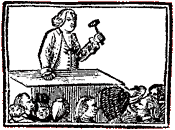“This House will impeach Peter Oliver, Esq;”
The memoir doesn’t state when that happened, only that it occurred after Adams’s exchange of newspaper essays with William Brattle in early 1773.
We can say, however, when the assembly seized on the impeachment remedy. The 1773–74 legislative year started on 26 May, and on 28 June, the second-to-last day of its first session, the house resolved:
That it is the incumbent Duty of the Judges of the Superior Court without Delay, explicitly to Declare, whether they are Determined to Receive the Grants of the General Assembly of this Province, or to Accept of their Support from the Crown;…And in such Case [of delay] it will be the indispensible Duty of the Commons of this Province, to Impeach them before the Governor and Council, as Men disqualified to hold the important Posts they now sustain.The house thus laid out its plan for the coming months. But that game plan still took a long time to play out.
The house reconvened on 26 Jan 1774. By then the colony was anxiously waiting to see how Parliament and its ministers in London would respond to the Boston Tea Party. But there were still unfinished local business.
On 1 February, the house noted a letter from Justice Edmund Trowbridge saying he wouldn’t take any salary from the Crown. (On that same day the house dismissed John Malcolm’s petition for redress.) The next day, the body demanded answers from the other justices within six days. (It also approved a payment of £500 to Benjamin Franklin for his services, which included the infamous leak.)
In a reply dated 3 February and read to the house on Monday, 7 February, Chief Justice Oliver said he had accepted the royal salary since July 1772. And that he would continue to do so “lest I should incur a Censure from the best of Sovereigns,” which would be George III.
On 11 February, the house approved a remonstrance against Oliver, “praying that he may not be suffered any more to sit and act in his Office of Chief Justice.” There were nine votes against. Three days later, the full legislature agreed that the superior court should be adjourned for three days as this was worked out.
The next day, Gov. Thomas Hutchinson responded to the remonstrance, promising to send it to the royal government in London but refusing to interfere with that government’s choice to put Oliver on the bench and pay him.
The day after that, the house invited the Council to respond to this action. In the afternoon, it resolved that the whole house wait on Gov. Hutchinson and give him a petition seeking “the Removal of the Chief Justice.” Two days later, on 18 February, the house went into the Council chamber and speaker Thomas Cushing read this petition to the governor.
On Monday, 21 February, the house passed another resolve saying it would be “highly improper, and contrary to Usage and Precedent,” for Chief Justice Oliver to sit on the court while this dispute was ongoing.
The next day, Gov. Hutchinson summoned the house members to the Council chamber. He told them he “was obliged to decline” the request to remove Oliver, and that they had misrepresented parts of the provincial charter. In response, at the end of the session on 22 February, the house resolved “That this House will impeach Peter Oliver, Esq; Chief Justice of the Superior Court, of certain High Crimes and Misdemeanors.”
And finally on 24 February, the house did vote to impeach, with only eight nay votes. The was 250 years ago this week. The representatives chose a committee, headed by Samuel Adams, to “lay before the Governor and Council a Copy of the Articles of Impeachment.”
Because impeachment in the lower house was only the start of the process. Based on the model of Parliament, the next step was for the upper house, the Council, to try the case. And, needless to say, Gov. Hutchinson was not ready to allow that.
TOMORROW: The governor’s move.




